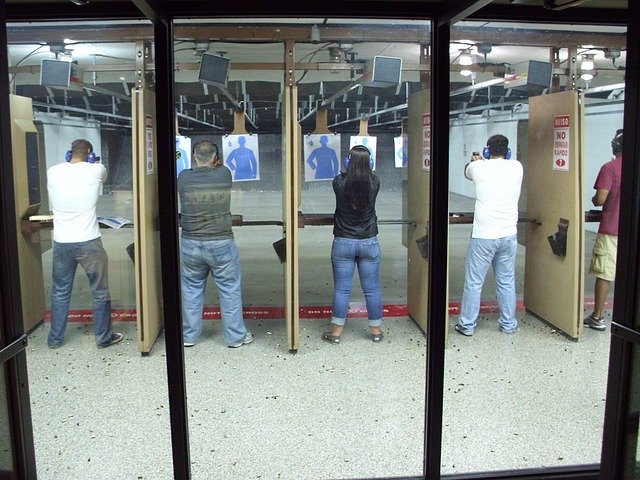About 40 million US citizens take joy in recreational shooting every year. Most of these do it because it’s pure fun firing at targets and hitting them. Others do it to sharpen their shooting skills for hunting and self-defense.
Others engage in recreational shooting to reap health benefits such as increasing mental and physical discipline, boosting arm strength and ability to focus, exercising eye capabilities, and elevating personal responsibility.
Whatever your reason for recreational shooting might be, remember that there are regulations to ensure you maintain your safety and that of others. And while these codes of conduct vary from state to state, the following are the most common across most of the jurisdictions:
- Federal Firearms License
In order to manufacture or sell firearms as an individual or a company, you need to have the Federal Firearms License (FFL). This applies to both interstate and intrastate sales.
Now, it’s not always a guarantee that you’ll get the license once you make an application. The licensing committee has to carry out background checks to ensure that your business is fully compliant with all state and local laws. If you fail to satisfy the requirements, you’ll be denied the license, yet operating without one has severe penalties and consequences.
A great alternative is to work with 80% lowers. These are receivers that are machined to 80% completeness, meaning that there remains some 20% work to make them legal firearms. The Bureau of Alcohol, Tobacco, Firearms, and Explosives (BATFE) doesn’t recognize 80% lowers as firearms. Therefore, you won’t need to register the firearms nor apply for the FFL. Additionally, 80% lowers have no transfer fees as is the case with legal firearms.
All that’s left is to complete building the firearm with a reliable receiver jig.
- Hunting License
If you intend to go hunting with your firearm, you must first acquire a state-specific hunting license. You can get these online or at selected stores for a fee.
Usually, the maximum allowable number of kills and validity period of the license are indicated. The type of game animals you’re allowed to kill is also specified.
- Citizenship
Only US citizens and green card holders are allowed to possess firearms. If you’re an undocumented immigrant, the law doesn’t allow you to own any firearm or ammunition.
And if you came to the US specifically for hunting, make sure to have your non-immigrant visa, hunting license, or sporting permit. If this feels bothersome to you, you can simply rent a firearm from the shooting range and strictly use it within the designated areas.
- Assault Weapon Bans
Civilians aren’t allowed to use a number of semi-automatic firearms classified as assault weapons and large-capacity ammunition feeding devices. While this was initially a federal ban, the 10-year period expired in 2004. Even so, some states impose the ban time after time to reduce firearm homicides and criminal activity.
- Code Of Federal Regulations
This document provides the following guidelines for recreational shooters:
- You must keep a distance of not less than 138 meters from buildings, residences, campsites, and any occupied area
- You should never shoot across a road or water body
- You should never shoot within or into a cave
- You should never shoot where you expose people and property to damage
- You should never use any tracer bullet, plastic pellets, steel-core rounds, or incendiary ammunition
- Other Regulations
Some states have adopted other minor regulations such as:
- Your targets should only be paper, cardboard, metal, or thrown-type clay
- Your targets shouldn’t have a wooden backing
- You must never drink any alcoholic beverage while shooting
- You must never use exploding or glass targets
- Never fix targets on trees, rocks, or solid objects as such practice deface federal property
- Remove all trash, shell casings, targets, and debris after you’re done shooting and dispose of them appropriately
Wrapping It Up
It’s in your best interests to follow all these guidelines. Let it not be simply a matter of avoiding the long arm of the law. The regulations are there for your safety. So, on top of the rules, consider the following firearm best practices:
- Take every firearm as loaded
- Never point your gun’s muzzle at anything you don’t plan to shoot
- Keep the safety on until you get ready to shoot
- Avoid placing your finger on the trigger unless you’re ready to shoot
- Always look out for the presence of any person in your shooting direction before pulling the trigger
- Unload your firearms when not using them







And, oh yeah, I forgot – You DO NOT need a license, federal or otherwise, to manufacture firearms for your own use. One only violates the law if they sell one.
Are we clear on that?
“The regulations are there for your safety.”
Some of them are, yes. In fact, most of them are.
But there are some that are political ‘justified’ by the false argument that they will make everyone safer. Semiauto and magazine bans are such examples. They are purely political ‘statements’ expressing disapproval of certain choices of weapons, and they are unconstitutional.
Soon, they will be struck down by the SCOTUS, but don’t look for the Democrat nonsense to stop – state and local Democrat regimes are notorious for ignoring SCOTUS precedents, under the protection of leftist U.S. Districts. Until each of these malignant machinations reach the high Court and are struck down, they will vex and legally endanger everyone.